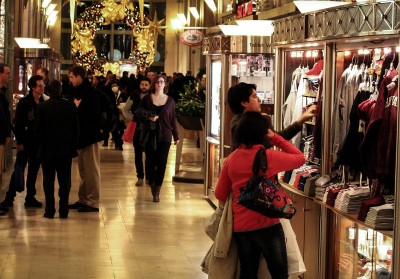
For many Americans, Thanksgiving weekend is family time as much as it is shopping time. Heralded as the busiest shopping day of the year, Black Friday sees stores such as Best Buy, Target, and Walmart open their doors as early as Thanksgiving evening. But for a lot of shoppers this holiday season, the prices didn’t justify the trouble of getting to the stores. For those still planning their holiday purchases, checking out Walmart check cashing details could be helpful in managing their budgets.
Though the economy has improved this year, with the GDP growing by 4.6 percent in the second quarter and 3.9 percent in the third quarter according to the U.S. Bureau of Economic Analysis, holiday shopper traffic actually dropped by 5.2 percent from 2013, a Nov. 30 report from the National Retail Federation found.
NRF President and CEO Matthew Shay said a stronger economy, coupled with the increasing popularity of online shopping, means consumers no longer need to brave the Black Friday crowds just to get a good deal.
“A strengthening economy that changes consumers’ reliance on deep discounts, a highly competitive environment, early promotions and the ability to shop 24/7 online all contributed to the shift witnessed this weekend,” Shay said.
The NRF report stated that 46.7 percent of shoppers said they shopped online on Black Friday, and 36.3 percent said they shopped online on Saturday. On Thanksgiving Day, 26.2 percent of shoppers were online.
Despite the convenience of online shopping, for some consumers there is a certain excitement in physically purchasing goods on Black Friday. National reports may have found a decrease in Black Friday shopping activity, but in and around Boston, crowds continued rushing to stores for their Black Friday sales and incentives. Faneuil Hall welcomed a generous crowd over the Thanksgiving weekend, said Ann Murphy, senior vice president at O’Neill and Associates, a firm representing Faneuil Hall Marketplace.
“The Faneuil Hall Marketplace merchants, both retailers and restaurants, offered attractive Black Friday specials and sales,” Murphy said in an email. “They [vendors] had a lot of shoppers on Black Friday and on Saturday, especially toward the afternoon when visitors combined their shopping with viewing the nearly 90-foot Christmas tree light show.”
The market took the opportunity to launch both holiday sales and attractions, from the annual performance of hundreds of tuba players, called Tuba Christmas, to the festive tree lightings, Murphy said.
Still, other shoppers felt that in-store shopping drop-off. Katie Roe, a sophomore in the College of Arts and Sciences, found herself sucked into the excitement of Black Friday but missed out on its infamous chaos.
“Because it was too expensive for me to go home this Thanksgiving, I ended up staying on my friend’s couch,” Roe said. “While I am not a Black Friday shopper, she and her family are. I ended up buying and spending more than I expected, but overall, it was an okay experience. The outlet mall we went to wasn’t hectic or crazy at all.”
Outside of big-name shopping destinations, though, holiday deals are still popping up around the city’s smaller businesses. Hopsters, a craft brewery in Newton, decided to start their discounts after the Thanksgiving weekend. While Hopsters did not participate in Small Business Saturday, an American Express-sponsored initiative to support small business owners, it did start a gift card special on Cyber Monday, said general manager Danielle Bax.
“[We were] offering a gift card special, [where costumers who] spend $200 on Cyber Monday … get a $50 bonus card. The bonus can be used after Dec. 25,” Bax said.
By offering deals of their own, small businesses can get their own boost from holiday shoppers’ need to shop, and businesses across the cities can attract consumers to items they wouldn’t normally search for.
“Target had really good sales, so I got a ton of sportswear,” remembered Caroline Soh, a sophomore in the School of Hospitality Administration. “And Urban [Outfitters] had good stuff too, so I got a cocktail shaker that looks like sriracha.”














